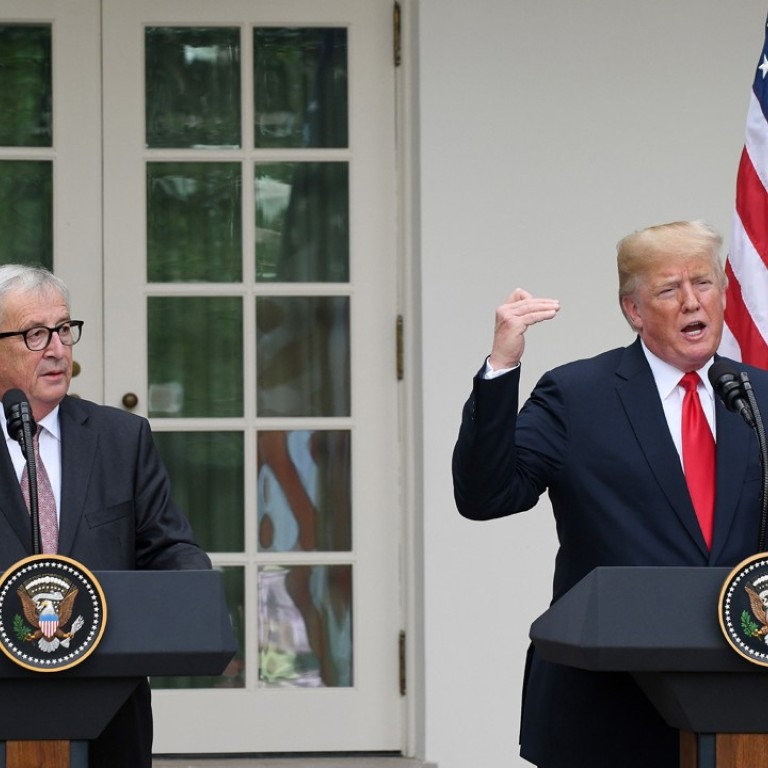
Politico | Juncker and Trump’s transatlantic trade truce falters
In an unusually outspoken attack, two top US officials made clear that Donald Trump was growing frustrated with Europe’s foot-dragging over a promised trade deal
This story is published in a content partnership with POLITICO. It was originally reported by Jakob Hanke, Christian Oliver and Megan Casella on politico.com on October 17, 2018.
Europe’s fragile peace deal with the US on trade is at breaking point.
Washington is again threatening high tariffs on Europe’s all-important car industry just as US President Donald Trump is seeking to whip up support before midterm elections on November 6.
In an unusually outspoken attack, two top US officials on Wednesday made clear that Trump was growing frustrated with Europe’s foot-dragging over a promised trade deal, and was gearing up to roll out car tariffs put on ice in July.
The latest back-and-forth comes just a day after the Trump administration formally notified Congress that it was planning to begin trade negotiations with the European Union.
But the openly hostile remarks from Ross and US Ambassador to the EU Gordon Sondland are a sign that a trade truce secured by European Commission President Jean-Claude Juncker on a visit to the White House in July is now faltering.
In that deal, Washington agreed to hold off car tariffs on the understanding that both parties would work quickly toward a broader EU-US trade deal.
On Wednesday, however, the two officials accused Malmström of treading water.
Referring to his Tuesday talks with Malmström, Ross said he warned her that he would only hold fire on new tariffs on Europe for “as long as talks are going satisfactorily.”
He then suggested, however, that the commissioner from Sweden was taking too long.
“This is not meant to be a five-year project: This is meant to be something that was to move quickly and in a cooperative fashion.”
He also complained that Malmström was too far from opening real negotiations. Ross said: “maybe she’ll think about doing a scoping exercise and maybe after the scoping exercise there’ll be some negotiations,” a reference to the EU’s multistage approach to negotiations.
Donald Trump declares US and EU ‘love each other!’ after deal to ease trade tensions
When asked whether he had prepared the market study that would enable him to launch sanctions against the European auto industry, Ross hinted the US was ready to strike.
“The study will be ready when it’s needed and that’s as far as I’m prepared to go today,” Ross said.
The Office of the US Trade Representative, which is in charge of formal trade negotiations with the EU, did not immediately respond to a request for comment on the remarks or on the current status of the talks.
Sondland, the ambassador, was even blunter in his assessment of the EU’s pace. He suggested Malmström and her team could be deliberately stalling and charged her team with “complete intransigence.”
“I don’t know whether the delays are purposeful, whether they are part of a plan to potentially wait out the term of President Trump. As far as I’m concerned President Trump will be the president of the United States until 2024 and I think it’s a futile exercise to do that,” he added.
Ross also insisted that the US was keen to explore “all sectors where there are protectionist things now.”
Japan and EU sign ‘biggest’ trade deal as Donald Trump puts up barriers
“We have not started negotiating yet,” she said.
“We have asked, and said that we are prepared, several times, to start the scoping exercise on a limited agreement focused on industrial goods on tariffs there. So far the US has not shown any big interest there, so the ball is in their court.”
These comments irritated Ross, who said: “If the quotes are accurate they would appear to us as though she was at a different meeting from the one that we attended.”
Ross and Sondland’s comments came as little surprise to some in Washington who felt that July’s agreement to withhold automotive tariffs was mostly an empty promise that would do little to keep the president from changing his mind and moving forward with penalties.
“This is how they’ve been conducting trade diplomacy,” said Gary Hufbauer, a senior fellow at the Peterson Institute for International Economics.
He added that relations also soured when the Trump administration was pursuing other trade deals like those that have been completed with South Korea, Canada and Mexico.
“We’ve seen this playbook before,” he said.
“The question is whether they can work through this playbook with Europe, and I’m pretty sceptical.”
This report first appeared on POLITICO. EU on October 17, 2018.

